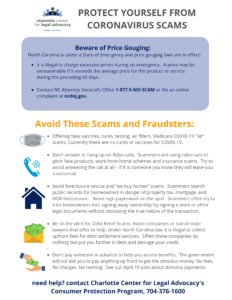Scammers are always looking to take advantage of unsuspecting victims, especially in times of uncertainty. The more you and loved ones know about scams, the easier it is to spot and avoid them.
Beware of Price Gouging
North Carolina is under a State of Emergency and price gouging laws are in effect:
- It is illegal to charge excessive prices during an emergency. A price may be unreasonable if it exceeds the average price for the product or service during the preceding 60 days.
- Contact NC Attorney General’s Office 1-877-5-NO-SCAM or file an online complaint
Tips to Avoid Scammers and Fraudsters
- Be aware of COVID-19 vaccine scams. Everyone who wants a vaccine can have one and the vaccine will be free for most people. Learn more about COVID scams here.
- Don’t answer or hang up on Robo-calls. Scammers are using robo-calls to pitch fake products, work-from-home schemes and insurance scams. Try to avoid answering the call at all – if it is someone you know they will leave you a voicemail.
- Avoid false utility company representatives: Scammers are calling to dupe people out of their cash and personal information by convincing them their utilities will be shut off if they don’t pay. If you get a call from someone claiming to be your utility company, firmly tell them you will contact the utility company directly using the number on your bill or on the company’s website. Even if the caller insists you have a past due bill or your services will be shut off, never give banking information over the phone unless you place the call to a number you know is legitimate. Utility companies neither demand banking information by email or phone nor demand payment by gift cards (like iTunes or Amazon), cash reload cards (like MoneyPak, Vanilla, or Reloadit), or cryptocurrency (like Bitcoin), these are scams.
- Avoid foreclosure rescue and “we buy homes” scams. Scammers search public records for homeowners in danger of property tax, mortgage, and HOA foreclosure. Never sign paperwork on the spot. Scammers often try to trick homeowners into signing away ownership by signing a deed or other legal documents without disclosing the true nature of the transaction.
- Be on the alert for Debt-Relief Scams. Avoid companies or out-of-state lawyers that offer to help. Under North Carolina law, it is illegal to collect upfront fees for debt settlement services. Often these companies do nothing but put you further in debt and damage your credit.
- Don’t pay someone in advance to help you access benefits. The government will not ask you to pay anything up front to get the stimulus money. No fees. No charges. No nothing. See our April 19 post about stimulus payments.
- Avoid Social Security scams. The government will not call to ask for your Social Security number, bank account, or credit card number. Anyone who does is a scammer. Don’t “verify” your number or be scared into thinking your benefits are about to be suspended.
- Watch out for phishing emails and texts about the coronavirus that appear to be from health officials, experts, or anyone else. Don’t open messages, click on links, or download attachments from senders you don’t recognize.
- Be cautious of offers to help get groceries, do errands – there are a number of good Samaritans, but unfortunately there have also been reports of scams, money given, nothing delivered.
- Beware of “person in need” and grandparent scams. Scammers pose as a grandchild, friend or relative stranded or otherwise in trouble and need money quickly and quietly. They may ask for money by mail or gift card. Don’t be pressured, hang up and call another relative or friend if you are still concerned to help you investigate.
- Be careful before you donate to a COVID-related charity. Check legitimacy through the North Carolina Secretary of State, Charity Watch, or Charity Navigator.
- Be cautious of any unsolicited door-to-door sales pitch or offers. Don’t sign or agree to anything on the spot – if an offer seems too good to be true it probably is.
Still have questions or need help? Contact Charlotte Center for Legal Advocacy’s Consumer Protection Program for more information, 704-376-1600. Stay safe everyone!
Additional Resources
Read more information and report scams through the links below and pass it on:
Federal Trade Commission scam page
Consumer Financial Protection Bureau
N.C. Department of Justice Consumer Complaints
National Center for Disaster Fraud
